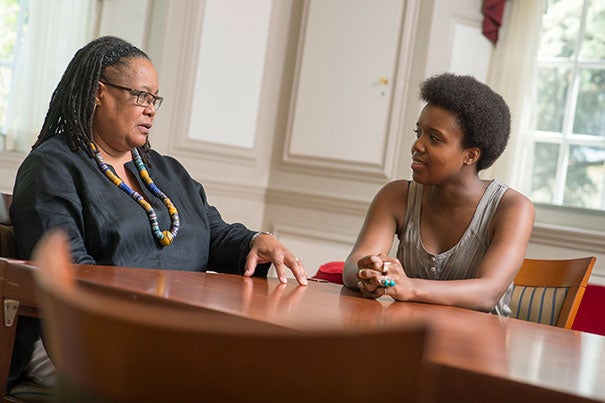
“I understood the value of mentoring because I had lots of mentors,” said Harvard Professor Evelynn M. Hammonds, who mentored Savannah Turner (right) as part of the Summer Research Opportunities at Harvard program. Turner is a junior at Wesleyan University.
Photo by Tony Rinaldo
The value of mentoring
Hammonds shows young scholars the path to an academic career
As an undergraduate at Spelman College in Atlanta, Evelynn M. Hammonds participated in a Bell Labs–sponsored summer research opportunity for women and minorities that introduced her to the importance of mentorship and the power of building community. Now the Barbara Gutmann Rosenkrantz Professor of the History of Science and Professor of African and African American Studies, Hammonds has spent the bulk of her career fostering relationships with students and building similar growth opportunities for them.
“I understood the value of mentoring because I had lots of mentors,” she says. “At Bell Labs, we learned how to present our work and received professional development training in addition to conducting research.”
That experience helped Hammonds take her first steps toward an academic career, and it also introduced her to like-minded students. “There are people from Bell Labs that I am still friends with after so long, many of whom I went to graduate school with” she says. “For me, this program was an exemplary example of what we try to accomplish at Harvard, which is to bring in more students of color, get them excited and keep them excited about their work, help them find a community, and use that community to continue to develop their skills even after they leave here.”
During the summer, Hammonds served as a mentor for Summer Research Opportunities at Harvard (SROH), a 10-week residential program that exposes undergraduates from across the country to life in a research university. Dedicated to training young scholars from ethnic, racial, and socioeconomic groups traditionally underrepresented in graduate training, SROH is currently administered by Harvard’s Graduate School of Arts and Sciences (GSAS). Hammonds helped lay the groundwork for the program — which joined similar, science-focused initiatives when it was launched by the Provost’s Office in 2009 — while serving as senior vice provost for faculty development and diversity. Since its inception, SROH has connected students with Harvard faculty in the humanities, socials sciences, and the sciences so that they can learn how academic scholars conduct research, in the process developing connections that can assist them as they pursue graduate study.
“It’s motivating to see where people started and where they are now at Harvard,” says Savannah Turner, a junior at Wesleyan University in Middletown, Conn., who worked with Hammonds. “That’s one of my favorite parts of the program.”
Turner had never conducted serious academic research before participating in SROH. “This program and especially working with Professor Hammonds has allowed me to understand the research process and motivated me to learn more,” she says. “There’s so much more to it than simply reading books or searching on a computer, you have to connect with people so that you can craft a question and an argument. And you need to present your results, which is something I’ve never done before.”
With sessions on effective presentation skills, GRE preparation, and research design, the program also strengthens students’ ability to market themselves. Students deliver talks about their project to a cohort, who provide feedback on presentation and content. Each talk is followed by a conversation with the presenter’s mentor, who shares what it took to obtain a Ph.D. and succeed in academia.
When Turner arrived in June, she began working with Hammonds on a project about African-American scientists and inventors, about whom she knew little. Hammonds gave her books and Turner dove in.
“The first thing that grabbed my attention was how technological advances served as a pathway to African-American entrepreneurship,” Turner says. “It was a very big subject, so I had to keep refining it. Professor Hammonds and I met every week and she advised me on the sources to use. Since there are so many resources available, I also met with a librarian at Widener Library who helped me narrow my options.”
By the end of the summer, Turner had written a 20-page paper and developed the confidence to deliver a 10-minute summary of her findings.
For Hammonds, getting a student excited about the work is the first and most important step as a mentor. “When students come in with a topic they already care about, I try to ensure that they have really delved deeply into that project,” she says. “I focus on helping them to see what research is really about. And I try to find ways to help them understand that the projects they work on aren’t just a representation of their point of view, but also involve a body of literature that they need to understand and master and learn how to integrate some of that existing literature into strengthening their own ideas.”
Turner thrived in SROH. “I feel like this experience has prepared me for anything I decide to do in the future,” she says. “Even if I don’t choose to pursue an academic career, being able to find an area that interests me, understand its various components, and present my results is invaluable.”




